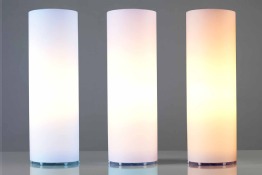Staying active through the winter with the right light
In Germany, winter times– the darkest season of the year – officially begins this weekend when the clocks go back. The clocks are turned back one hour in the night between Saturday and Sunday – something our biological clocks are never prepared for. But the right light can promote wellbeing and help us feel fitter.

Lighting which imitates natural light supports our body clocks, which is why lights used during the day should have a higher proportion of blue whereas warm colors are suitable for the evenings. These practical light tips from Osram biologist, Dr. Andreas Wojtysiak, will also help you adjust to your new daily rhythm:
During the day:
People who are unable to spend much time outdoors should make sure they get enough light with a cool color temperature (bluish white) during the day. In offices, for instance, fluorescent lamps with a cold white light color have a stimulating effect. A bright atmosphere is important in the home, too, whether it comes through the windows or from lamps.
In the evening:
Light in the evening prolongs the daytime for your body clock and staves off tiredness. So when the clocks go back, it is a good idea to take a walk in the daylight as late in the evening as possible. It is also helpful to use lights with a low proportion of blue at home in the evenings, for instance halogen lamps or energy-saving lamps in the light color "warm comfort light".
However, the opposite applies around the time that the clocks go back for the winter time: Light with a high proportion of blue can help you stay awake longer and adapt to the new times. Once you have adjusted to the time change, however, you should go back to using artificial light with a low blue content.
In general:
The best cure for the winter blues is plenty of natural light from the sky, in other words, bluish light during the day and darkness in the evenings. So harness the effects of natural light as often as possible by spending plenty of time outdoors. Light has an impact!
For some time now, Osram has been researching the way in which artificial light can affect the people's biological clocks. After all, light is man's most important natural timekeeper: It makes sure that our body clocks are set to a 24-hour rhythm and controls key physical functions such as the sleep/wake cycle, body temperature and hormone production.
Osram has already proven the influence of artificial daylight on the body in extensive studies, most recently in a joint study conducted with the Transfer Center for Neurosciences and Learning (ZNL) of the University of Ulm. Conducted at two schools in the German town of Ulm, this field study showed that biologically optimized light improved pupils' concentration and speed of performance.





